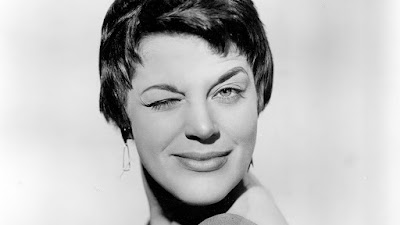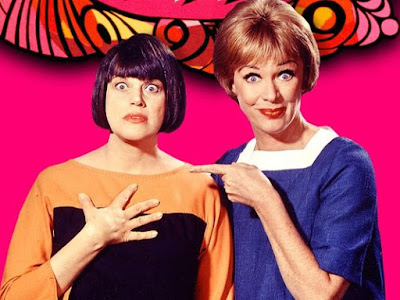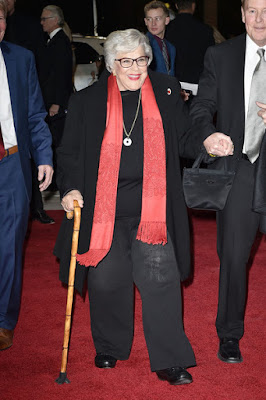Her death was announced by her lawyer, Mark Sendroff.
Ms. Ballard wasn’t a top-flight singer, an Oscar-caliber actress or a drop-dead beauty — she once played one of Cinderella’s ugly stepsisters — but she made up for any shortcomings with determination and a sheer love of performing.
Even after she became well known, Ms. Ballard was not above taking parts in touring shows and regional theaters, and she rode the nightclub circuit for years, though she found the pace exhausting. In 2000, in her mid-70s, she brought a cabaret show to Arci’s Place in Manhattan called “Another Final Farewell Appearance,” but there was nothing final about it: Later in the decade she was still hard at work, including in tours of “The Full Monty” and “Nunsense.”
For the last 40 years or so of her performing career, wherever she was appearing people would mention one particular item from her lengthy résumé: “The Mothers-in-Law,” an NBC sitcom in which she and Eve Arden played neighbors whose children married, turning the newly minted mothers-in-law into partners in meddling.
Ms. Ballard was born Catherine Gloria Balotta in Cleveland on Nov. 20, 1925, the second of four children. Her father, Vincenzo, and her mother, Lena (Nacarato) Balotta, had both immigrated from Italy. Her father laid concrete sidewalks for a living. “He used to take me all over Cleveland showing me his work,” Ms. Ballard wrote.
Even as a child she wanted to be an entertainer, and she passed up a scholarship to Cleveland Art College to pursue that goal. She got her first laughs doing impressions, a skill that served her well for decades in her nightclub acts. (She did a pretty good Bette Davis. She and a second impressionist once appeared on the TV game show “To Tell the Truth” along with Davis herself; four masked panelists asked questions and tried to guess which of the three was the real thing. Davis received three votes, but Ms. Ballard got the other.)
Ms. Ballard found an agent in Cleveland and played some local spots, calling herself Kay Ballad; the first name soon acquired an E and the last an R. Then, not yet 20, she was booked on a burlesque tour, doing impressions and skits, which led to a job in Detroit at the Bowery Room, whose owner knew the bandleader Spike Jones and spoke highly of her to him. She hopped a plane to Los Angeles to try to talk her way into Jones’s show and succeeded, winding up singing and also, using her high school band skills, playing flute and tuba.
Stage appearances all over the country followed in the next several years. Then, in 1954, she won the part of Helen (as in “of Troy”) in “The Golden Apple,” an unusual musical with book and lyrics by John Latouche and music by Jerome Moross that drew on “The Iliad” to tell a story set in early-20th-century Washington State.
The show opened at the Phoenix Theater in the East Village and, riding strong reviews, moved to Broadway soon after, running there for 125 performances. Ms. Ballard’s part included the song “Lazy Afternoon,” which Brooks Atkinson, in The New York Times, called “a triumphant number and the high point of the show.” The song was later recorded by many artists, including Barbra Streisand, but Ms. Ballard was the first to release it as a single; on the flip side of that record she introduced another song later made far more famous by others (including, memorably, Peggy Lee and Frank Sinatra), Bart Howard’s “Fly Me to the Moon” (then called “In Other Words”).
Her next Broadway role, in 1961, was also in an atypical musical: “Carnival!,” with music and lyrics by Bob Merrill and a book by Michael Stewart. Unlike “The Golden Apple,” though, this one enjoyed a sustained Broadway run, lasting almost two years. Ms. Ballard was the Incomparable Rosalie, a magician’s assistant. For one song, “Always, Always You,” she was in a basket into which her boss, Marco the Magnificent (James Mitchell), kept thrusting swords.
Breast cancer, diagnosed in 1994, slowed her down only briefly. Her successes after that included an appearance in a widely acclaimed revival of “Follies” at the Paper Mill Playhouse in New Jersey in 1998.
Ms. Ballard, who never married but said she had been engaged four times, leaves no immediate survivors.
Last week, a new documentary about her career by Dan Wingate, “Kaye Ballard — The Show Goes On!,” was screened at the Palm Springs International Film Festival.
Despite her name recognition, Ms. Ballard knew that she was never an A-list star. Instead, she viewed herself as being in the honorable second tier of performers who work hard but might not achieve lasting fame. Another was Billy De Wolfe, a character actor and friend who died in 1974, and whom she honored with a brief chapter in her book.
“He’s yet another performer who falls into the category of brilliant ‘supporting players’ who I feel left the public’s consciousness much too soon after they passed away,” she wrote. “Who knows, perhaps I have a fear that the same thing will happen to me.”





No comments:
Post a Comment